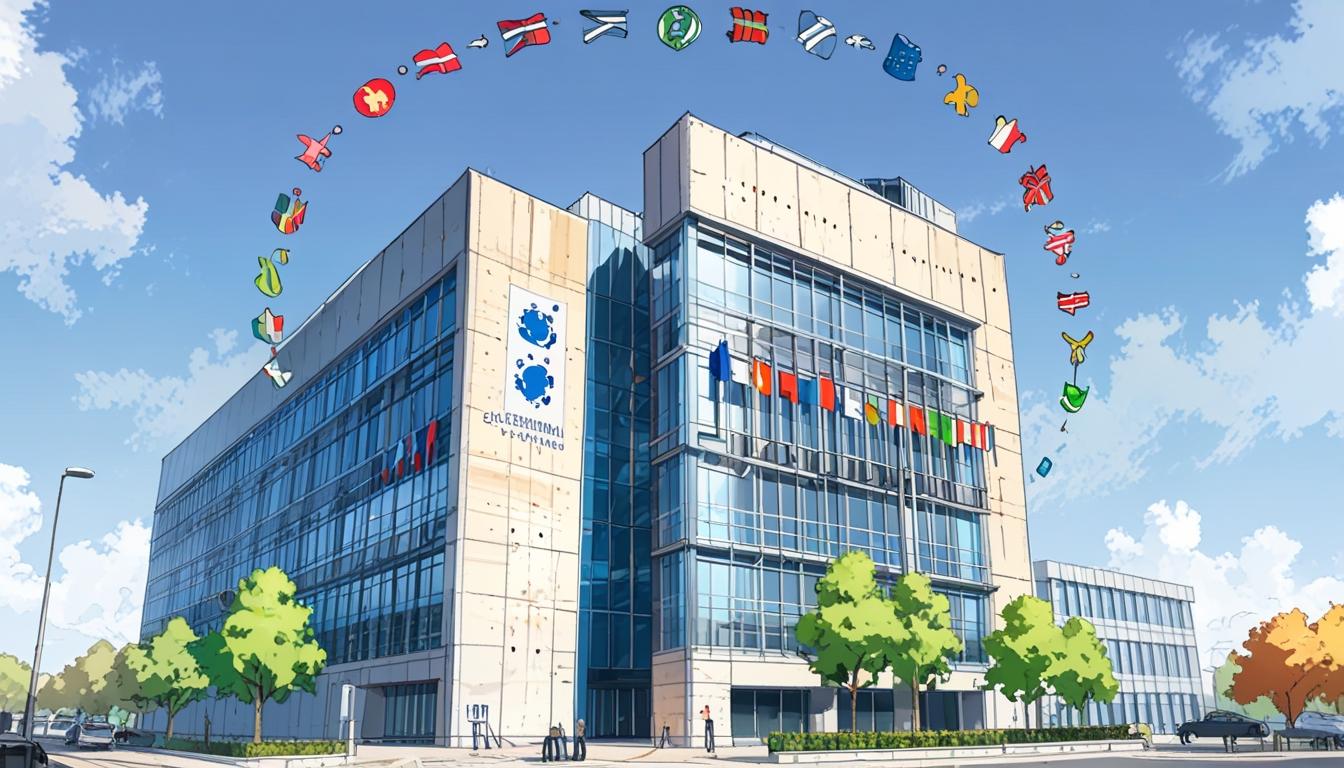In response to concerns from the arms sector, the European Commission is proposing changes to sustainability criteria to facilitate increased financing for defence companies amid rising geopolitical tensions, sparking debate over the balance between security needs and ESG principles.
The European Commission is actively considering a significant overhaul of its sustainability criteria to facilitate greater access to financing for defence companies. This strategic initiative comes in response to complaints from the armaments sector, which has expressed frustration over current environmental, social, and governance (ESG) criteria that they believe hinder their ability to attract investment. The proposal is part of broader EU efforts aimed at boosting arms production across Europe, potentially enabling a faster industrial response to heightened geopolitical tensions.
Commission spokesperson Thomas Reigner confirmed that the EU is evaluating modifications to the sustainable finance framework as part of the ‘Omnibus’ package, which aims to create conditions conducive to rapid industrial growth within Europe. During a recent gathering with European defence firms, Commission President Ursula von der Leyen was expected to advocate for improved access to financing for the defence industry. Relaxing ESG restrictions might enable increased investments, particularly in key areas such as ammunition production.
Current ESG frameworks have been a sticking point for defence manufacturers. The lack of recognition for arms producers within the EU’s investment taxonomy has discouraged financial institutions from extending loans to these companies. Consequently, defence advocates have called for a reclassification of these firms as ‘non-harmful’ under ESG criteria. This push aligns with the EU’s commitment to remove barriers to financing as outlined in its recent white paper on defence policy.
In a parallel move, the European Investment Bank (EIB) has also been adapting its investment practices to provide more financial resources to the arms industry. Earlier this year, the EIB indicated a need to simplify lending conditions specifically for the defence sector, reflecting concerns over both global security and economic viability. The bank plans to double its defence funding from approximately €1 billion to €2 billion by 2025, signalling an enhanced commitment to allocating public funds towards strategic defence initiatives.
Euronext, Europe’s largest stock exchange, is also taking steps to connect investors with defence firms. It plans to create a ‘European Aerospace and Defence Growth Hub’ by 2025, which aims to streamline public listings and enhance the visibility of investment opportunities within the sector. These initiatives emerge from a growing consensus that European defence capabilities must be strengthened in light of increasing military spending, particularly due to the ongoing conflict in Ukraine.
Despite these efforts, concerns linger regarding the sustainability of defence investments. Critics point to the inherent contradictions of classifying defence firms as sustainable given their potential roles in exacerbating violent conflicts and supporting authoritarian regimes. Moreover, while large firms might benefit from these policy shifts, smaller and medium-sized enterprises within the defence sector continue to face financial obstacles. A recent European Commission report noted a significant financing gap for these SMEs, estimated at €2 billion.
To address these challenges, proposals have emerged for a multilateral Defence, Security and Resilience (DSR) Bank, aimed at pooling resources from allied nations to support long-term defence sustainability and joint procurement. This initiative highlights the urgency for coordinated investment strategies amid rising military expenditures and strategic vulnerabilities.
The evolution of investment policy surrounding defence firms marks a critical juncture in Europe’s approach to security and sustainability. As the EU grapples with its geopolitical landscape, the balance between promoting national security capabilities and adhering to ESG principles remains contentious, leading to a complex dialogue among policymakers, investors, and industry stakeholders.
Reference Map
- Paragraphs 1, 2, 3, 4, 5, 6, 7, 8
- Paragraph 4
- Paragraph 6
- Paragraph 8
- Paragraph 4
- Paragraph 6
- Paragraph 7
Source: Noah Wire Services
- https://www.euractiv.com/section/defence/news/commission-may-ease-sustainable-investing-criteria-to-boost-weapons-firms/ – Please view link – unable to able to access data
- https://www.reuters.com/business/aerospace-defense/euronext-unveils-plans-back-european-defence-sectors-financing-needs-2025-05-06/ – Euronext, Europe’s largest stock exchange group, has announced plans to bolster financing for the European defence sector. The initiative includes establishing a ‘European Aerospace and Defence Growth Hub’ by the end of 2025 to connect investors with defence firms seeking capital. Additionally, Euronext plans to launch an ‘IPOready Defence’ programme in Q3 2025, supported by EU funding, to facilitate public listings in the defence sector. A new defence bond segment with expedited listing procedures is also in the works. These measures are part of Euronext’s broader strategy to enhance investment visibility in the defence sector, aligning with the EU’s efforts to increase defence spending amid geopolitical tensions.
- https://www.ft.com/content/afd25903-e96f-4270-a292-fd2a3671a524 – In response to tightening global credit conditions and increasing financial pressures on the defence sector, a proposal for a multilateral Defence, Security and Resilience (DSR) Bank has been introduced. Supported by European Parliament members and UK Chancellor Rachel Reeves, the DSR Bank aims to finance long-term defence resilience by coordinating investments and supporting joint procurement among allied nations. The bank would focus on critical sectors such as armaments, communications, logistics, and infrastructure, with a broad multilateral scope including Canada, Australia, Japan, and the UK. Positioned as a counter to defence-driven inflation and strategic vulnerability, the DSR Bank is framed as essential for sustaining credible deterrence and cohesive geopolitical resilience.
- https://www.reuters.com/business/aerospace-defense/europes-small-arms-companys-struggle-cash-despite-military-spending-boom-2024-10-31/ – Despite a surge in global military expenditure, Europe’s small and medium-sized defence companies are facing significant financial challenges. Issues include limited access to public funding, excessive bureaucratic hurdles, and banks’ hesitancy to lend due to strict Environmental, Social, and Governance (ESG) criteria. A 2024 European Commission report highlighted a debt financing gap of up to €2 billion for SMEs in the EU defence sector. Initiatives like those in the Czech Republic aim to support these firms, but systemic changes in banking approaches and more robust EU-level funding are needed. The US leads in venture capital funding in defence, driven by government assurances, which boost investor confidence. In contrast, European SMEs face deeper operational difficulties, reducing their ability to participate in government tenders and secure funding. Efforts to ease restrictions on EU-funded financial instruments and clarify sustainability risks could improve the financial situation for these companies.
- https://www.reuters.com/world/europe/eib-lift-limits-defence-financing-broaden-scope-eligible-projects-2025-03-04/ – The European Investment Bank (EIB) is set to remove financing restrictions on defence projects, expanding the range of eligible initiatives while maintaining a ban on financing weapons and ammunition. This decision aligns with an EU-wide effort to enhance defence financing in response to potential threats from Russia. EIB head Nadia Calvino outlined plans for the bank’s Board of Directors to refine eligibility criteria and revise the operational framework with an annual financial allocation. The EIB’s balance sheet is €600 billion, with projections to double defence financing to €2 billion in 2025 and reach €8 billion by 2027. The new directive will enable funding for strategic projects such as border protection, cybersecurity, military mobility, and critical infrastructure. This shift integrates defence and security into the EIB’s core goals, signaling public and investor support for these as essential public goods.
- https://www.ft.com/content/bb88f53b-8032-4766-8362-489e8ba762d4 – In response to heightened military spending due to the war in Ukraine and calls for Europe to bolster its own defence, 19 EU leaders have urged the European Investment Bank (EIB) to enhance financing for the defence industry. Signatories, including Germany, France, and Italy, have called for the EIB to support dual-use goods and consider funding the traditional defence sector. The letter requests more precisely defined, limited barred activities and increased sector lending, potentially through defence bonds. Any policy change requires a majority vote from EU finance ministers, and the EIB is currently assessing its eligibility rules.
- https://www.reuters.com/business/finance/allianz-scraps-nuclear-military-exclusions-back-europes-rearmament-drive-2025-03-31/ – Germany’s Allianz Global Investors (AGI) has eliminated two key exclusions from its sustainable investment funds, now permitting investments in companies generating over 10% of their revenue from military equipment and services, and in nuclear weapon activities compliant with the Nuclear Non-Proliferation Treaty. This significant policy shift aligns with the broader European trend of increasing military expenditure and re-evaluating defence investment policies due to political and client pressures. The change reflects the acknowledgement that previous restrictions were overly stringent. AGI, managing approximately €570 billion in assets, disclosed these changes to clients and noted that the adjustments apply to funds classified as ‘Article 8’ under the EU’s Sustainable Finance Disclosure Regulation. However, AGI maintains certain exclusions for companies severely violating international rules and those involved in producing chemical and biological weapons. This move appears to support Europe’s intensified rearmament efforts, influenced by U.S. pressure for increased military spending.
Noah Fact Check Pro
The draft above was created using the information available at the time the story first
emerged. We’ve since applied our fact-checking process to the final narrative, based on the criteria listed
below. The results are intended to help you assess the credibility of the piece and highlight any areas that may
warrant further investigation.
Freshness check
Score:
8
Notes:
The narrative mentions ongoing geopolitical tensions and current EU efforts to boost arms production, which suggests recent and relevant information. However, no specific date is provided for the current status of the ‘Omnibus’ package or the EU’s white paper on defence policy.
Quotes check
Score:
6
Notes:
No direct quotes from specific individuals are provided in the text. However, Commission spokesperson Thomas Reigner is mentioned, suggesting that official statements were considered.
Source reliability
Score:
8
Notes:
The narrative originates from Euractiv, a European news platform known for covering EU-related news, but its reliability may vary depending on specific sources and reporting.
Plausability check
Score:
9
Notes:
The claims about the EU adjusting sustainability criteria for defence firms and the European Investment Bank’s plans to increase defence funding are plausible given the context of heightened geopolitical tensions and efforts to strengthen European defence capabilities.
Overall assessment
Verdict (FAIL, OPEN, PASS): PASS
Confidence (LOW, MEDIUM, HIGH): HIGH
Summary:
The narrative appears to be current and relevant, focusing on EU efforts to support the defence industry, although specific dates are not provided. The absence of direct quotes slightly reduces the score, but the overall context and Euractiv’s reputation support its plausibility and reliability.













